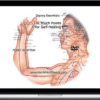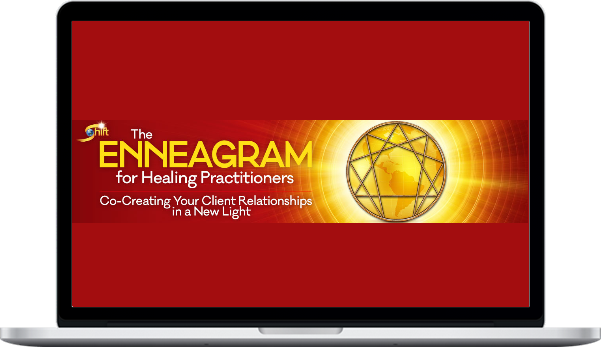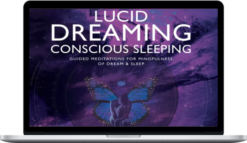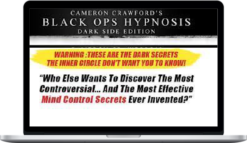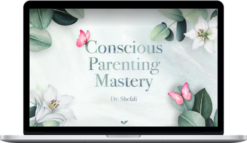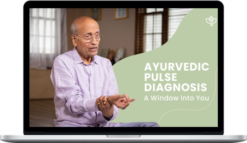Russ Hudson, Helen Palmer, David Daniels & Jessica Dibb – The Enneagram for Healing Practitioners
$1,497.00 $119.00
Total Sold: 4
» Instant Delivery
Description
Russ Hudson, Helen Palmer, David Daniels & Jessica Dibb – The Enneagram for Healing Practitioners

Do you want to develop new insights to apply in your professional work or healing practice to facilitate deep and lasting transformations?
Would you like to build more trust and rapport with your clients and minimize their resistance to change?
If so, then you’ll be excited to learn that for the first time, four leading “depth” teachers of the Enneagram have created a special course to give you an integral approach to healing, growth and human development through a time-tested system.
The Enneagram for Healing Practitioners offers therapists, social workers, coaches, educators, spiritual directors and healers a powerful tool for supporting clients that complements your primary approach.
The Enneagram transcends simple personality typologies to offer a multidimensional map of your own and your clients’ psyches and souls that can create a more empowered client-practitioner relationship. And as you deepen your understanding of the nine types, you’ll understand yourself and your clients more rapidly, and get to their core-motivation patterns, fears and challenges that would otherwise take far longer to recognize and address.
A great deal of research shows that the quality of a healing relationship, not the methodology itself, is the most important predictor of successful outcomes. A deeper understanding of the Enneagram will help your clients to feel more seen and therefore more connected to you. As a result, trust builds and the relational dynamic strengthens… which improves outcomes.
As you gain more rapid insights about the worldview and challenges associated with each Enneagram type, you are more quickly able to recognize and comprehend their core patterns — as well as the most effective ways to intervene.
The same principles apply to you as a practitioner. When you understand your own Enneagram type, you become more aware of your own motivation, mental and emotional patterns, and beliefs that can affect how you engage with clients.
Integrating the Enneagram into your client relationships leads you to recognize not only the patterns and fixations, but also the latent potentials within each type, inspiring greater healing and ultimately, a sense of wholeness in your clients.
As a healing practitioner, you are always expanding your understanding of the body, mind and soul. The Enneagram for Healing Practitioners training will allow you to harvest the best of decades of application in clinical, therapeutic, coaching, and consulting arenas so that you can become a more effective, skilled and self-aware practitioner.
If you are in a profession that deals with coaching, teaching, supporting or empowering people to live their full potential, an in-depth understanding of Enneagram types can be invaluable.
That’s because the kind of feedback, mirroring or guidance that works for one Enneagram type does not necessarily work as well for another type. So knowing how to navigate each type lets you offer more skilled interventions, coaching and psycho-spiritual support.
Developing your understanding of different types of people is thus one of the most important ways to advance your professional skills, giving you more clarity around other people’s core motivations, fears and challenges.
Evolving Your Understanding in a Multidimensional Way
To successfully apply the Enneagram in a client relationship is best accomplished by spending time with true masters of the Enneagram who can unveil the deeper levels of this “map of the soul” and how it can help liberate clients from fixed identities, unhealthy patterns and limited self-perceptions.
Each Enneagram teacher brings unique insights, which is why we have brought together four gifted teachers from two prominent schools — giving you the most multidimensional perspective into the Enneagram and its application in healing work ever offered in a virtual format.
Imagine having multiple Nobel Prize-winning chemists to tutor you in chemistry — that is what The Enneagram for Healing Practitioners will be like. It’s an opportunity to enter the depths of this highly effective system in a way that you never could with only a single perspective or teacher.
The value of interpreting the world through multiple lenses is intrinsic to the Enneagram itself, as it teaches you to see, honor and more effectively understand nine different types, with their unique patterns of aspiration, motivation, defense and shadow.
To apply the Enneagram in a healing context also means going beyond cookie-cutter descriptions. You can’t just type someone as a three and understand everything about them, reducing their full complexity to a stereotype.
The truth is that all of the types show up within all of us, albeit in lesser forms. So it’s essential for practitioners to have a more complex and multidimensional understanding. Seen in this way, the types are more like deep structures of the psyche that show up in everyone to some degree. Each type represents a pathway to wholeness, healing, and liberation.
So when we see, honor, and evoke those multiple pathways, it helps our clients achieve greater self-awareness, wholeness and mastery.
Why this Training Benefits You Personally
In addition to the professional benefits, why might this 5-month journey into the Enneagram be beneficial for your own growth and evolution?
We have no doubt that you are committed to living consciously and being as self-aware, clear and grounded as possible, and not only in your profession. Yet, every day you encounter situations and people that can trigger reactions and misunderstandings.
Even if you’ve been doing transformational work for decades, you may find yourself humbled by the ways these unconscious reactions bring you back to patterns you thought you had outgrown long ago.
Whatever the core patterning, every one of us has habitual ways of being that block our full self-expression, joy and positive impact in the world.
All of these unconscious patterns can cause suffering AND are linked to the specific coping mechanisms of different Enneagram types.
When these very human patterns are triggered, we all tend to forget the bigger picture of who we really are.
The more you can find clarity and free yourself from the ego-driven fears, desires and motivations that fuel your negative behavioral patterns, the more self-actualized a person you become, in addition to becoming a more and more skilled practitioner.
The Enneagram for Healing Practitioners will help you take your self-inquiry to the next level, with a transformative system of spiritual psychology that can evoke greater understanding of the wondrous complexity within you, while helping you more effectively work with other equally complex beings.
Over the course of 21 weeks, you will not only develop a deeper understanding of all nine types (which exist in every one of us), but you will also expand your understanding of new ways to work with all nine types through their psyches and souls.
Master Guides into Harnessing the Power of the Enneagram
The teachers of this program represent diverse perspectives sourced from two of the most respected schools for Enneagram studies and application in the world, The Enneagram Institute and Enneagram Studies in the Narrative Tradition (ESNT). They have taught this work for decades at the highest echelons and trained thousands worldwide.
Each teacher has had their own experiences and path, and they represent varied schools of thought, orientation and applications. So you will experience the richness of contrasting, complementary and resonant views for working with clients — perhaps even debate — and the fundamental unity of seemingly divergent approaches.
This unique program could lead to unparalleled dimensions of understanding and discovery — the teachers themselves are excited about what they will undoubtedly learn from each other.
Together, they will offer an in-depth, developmental and integral approach to the Enneagram that approaches the work in a holistic, multi-dimensional way.
During the 5-month training, these experts will go to the core of each Enneagram type, offering their unique perspectives to help you better understand, embody and create real transformation through the lens of each type.
More About the Enneagram
If you are not as familiar with the Enneagram, it is a powerful tool for personal and collective transformation. The nine-pointed Enneagram symbol represents nine distinct strategies for relating to the self, others and the world. Each of these Enneagram types expresses a different pattern of thinking, feeling and acting that arises from a deeper inner motivation or worldview.
These types or styles are not who you are, but show you the patterns that tend to dominate your experience.
The Enneagram illuminates nine ways we leave presence, nine ways we forget who we really are, nine unconscious patterns that can lead us away from all we truly care about — and also nine direct pathways to reclaiming your essential nature.
When you understand it in depth, the Enneagram reveals the inherent strengths or gifts that each type wants to bring to the world.
Each of these nine gifts is truly needed for human beings to evolve, and to create a world in which we can all thrive and flourish — personally, relationally and collectively. The Enneagram helps us see new ways to combine our diverse talents and particular forms of genius, and to see a bigger unity.
The wisdom of this system is valuable to promote personal well-being and to help build organizations, structures and institutions that we all relish and celebrate.
The Enneagram has not only withstood the test of time; it is a field of innovation and creativity, constantly inspiring new processes and practices for consciousness in spirituality, business, education, healthcare, relationships, psychology, coaching, parenting, sexuality, healing and more. It is currently being taught in graduate-level human development programs in esteemed universities and being used in advanced coaching and healing programs.
When people first accurately identify their individual Enneagram type and understand its key distinctions, they often describe the experience as akin to a spiritual awakening. This can feel like you’ve discovered a blueprint of your soul — all that makes you unique, as well as the similarities that unify us all.
If you’re new to this system, The Enneagram for Healing Practitioners will guide you to understand and apply this system in a powerful way. If you are already well-versed in the Enneagram, there will be plenty of advanced insights and applications that take your understanding to another level.
The program is specifically designed to support:
- Counselors, coaches, therapists, ministers, etc., in learning advanced strategies for working with others in ways that are multidimensional, effective, collaborative and empowering for the client
- Advanced students of the Enneagram who wish to deepen their inner practice and accelerate their unfolding
- All people interested in experiencing personal development, inner healing, presence, awakening and self-actualization
During the 21-week Enneagram for Healing Practitioners, you will:
- Gain a deeper understanding of Enneagram types and how the system as a whole works.
- Learn specific ways that you can apply your understanding of the types to client relationships.
- Learn how you, as a practitioner, can embody the essence of the types at head, heart and body levels to build rapport, trust and client confidence in the process.
- Develop an understanding of the triadic nature of the Enneagram and how the different centers contribute to core patterning.
- Understand type transference and counter-transference and and how it might limit client development.
- Understand Enneagram types from a developmental perspective and how childhood experience shapes the types.
- Understand a higher viewpoint of the transformational paths underpinning all types.
- Learn how to engage effectively with different types.
- Open to a deeper understanding of core defense and motivation patterns, so you can work with types, instead of unwittingly against them.
- Support yourself and your clients in experiencing greater freedom from self-judgement and self-sabotage.
- Harness strengths intrinsic to each type that are hidden in the core patterns.
- Recognize aspects of your personality that you may not normally see, that may be hindering client breakthroughs.
- Cultivate compassion and presence to help transform psychological patterns, reactivity and suffering.
What You’ll Learn in The Enneagram for Healing Practitioners
In this 21-week transformational intensive, each LIVE teaching, discussion and training session will build harmoniously upon the next. You’ll receive new principles, insights and processes for working with type in your clients and with your own type, with an eye towards developing truly co-creative therapeutic relationships.
Different faculty will co-teach each week and within every module. David Daniels, Helen Palmer, Russ Hudson, and Jessica Dibb will each elaborate on a specific area of expertise (as it relates to each Enneagram type), as follows:
Interwinding the Enneagram Elements
David Daniels will present the role of childhood temperament in the formation of personality and the implications for parents and caregivers. He’ll share the 5 vital ingredients of healthy relationships that flourish rather that flounder, and show you how to work with the key ingredient of developing a separate self and self-care and their vital function. Lastly, he’ll highlight the ingredients by type for intimate and close relationships, including sexuality.
Type and Its Inner Observer: A Spiritual Method for Psychological Distress
Helen Palmer will explore with the importance of observing the patterns of our minds and listening to the self-reports of people who see the world differently. This simple turn of attention that self-reflection requires marks a giant stage in human development.
In the language of neuroscience, self-reflection joins two different levels of consciousness — the conditioned level of the brain’s embedded neural pathways and the “pure knowing” of intuition that marks recurring habit as it appears. Clients can learn to turn attention inward to recognize automatic inner patterns that drive them in a predictable direction. With practice, clients can note their own repeating pattern such as doubt (type six) flattery (type two) and judgement (type one) as it starts to engage. Eventually, they can choose to let conditioned suffering go instead of letting it run.
Triadic Structures and the Enneagram: Optimizing Balance, Harmony and Transformation for Clients
Russ Hudson will address triadic structure of the Enneagram, to highlight distinctions that are useful in zeroing in on particular challenges and capacities that arise for clients, and also for exploring ways to bring about better balance.
The Enneagram as a “three by three system” offers a number of groupings that can be quickly employed to illuminate key issues and open new possibilities for the client. Among these groups are the Centers (Belly, Heart and Head) which delineate different modes of intelligence; the Hornevian Groups which reveal fundamental ways we approach goals, wishes and needs (Assertive, Dutiful, and Receptive);
The Harmonic Groups which highlight how we approach conflicts and interpersonal problems (Positive Outlook, Emotional Realness and Rational Competency); and the Object Relations Groups, which reveal underlying, and often subconscious, emotional convictions often at the root of the client’s psychological issues. Each Enneagram type represents a unique combination of these groups, and the groups are also useful in determining a client’s type.
Conscious and Unconscious Dialogue and Dance in Client/Practitioner Relationships
Jessica Dibb will address one of the most transformational aspects of the practitioner/client relationship: Learning to utilize the unconscious material and object relations that clients project onto practitioners (transference) and the unconscious material and object relations practitioners project onto clients (countertransference).
The framework of the Enneagram adds rich dimensions to this phenomena because each type will have certain qualities they wish for from a practitioner, and certain fears or blind spots they wish to avoid seeing or contacting in the practitioner. Additionally, the practitioner’s type can deeply affect what qualities and strengths they emphasize in the work with clients, and what blind spots or areas they actively deny, avoid or react to.
You’ll learn about type transference and type countertransference. And you’ll discover ways to be aware of this, ways to utilize the material that arises, and experiential exercises for working with blind spots in both yourself and your client. We will even occasionally dip into “relational therapy” that honors the unique relationship of each practitioner and client as important — and see how the practitioner’s type can bring strengths or limitations to the healing relationship.
Course sessions are on Wednesdays at 12:00pm Pacific.
Module 1: Practitioner Principles for Co-Creating Dynamic, Empowering & Enduring Change with Clients: Utilizing the Enneagram to Guide, Inspire & Ground Transformational Process (October 28)
Russ Hudson, Helen Palmer, David Daniels & Jessica Dibb will share the journey that brought them to discovering the Enneagram, why they value it, and the foundational understandings for using it in a client setting.
You’ll emerge from this first live session with a solid foundation of creative new ways to approach building relationships with clients that are empowering for both of you, create rapid change, and that are immediately accessible for clients of all nine types.
In this module, you will discover dynamic, creative ways to:
- Ways to utilize the knowledge of childhood temperament to help clients unravel their unconscious patterns.
- How to work with yourself and your clients to develop an Inner Observer that allows core defense mechanisms to relax.
- How to work with the Hornevian, Harmonic and Object Relations principles with each type for optimizing change.
- How transference issues arise for each type in clients, and can limit holistic development.
- How counter-transferrence issues arise for each type in facilitators, and can limit holistic development.
Additionally, your four co-teachers will make sure you have a shared understanding of the way they’ll be speaking of core principles and dynamics of the Enneagram, including the following for each type:
- The passion (core suffering)
- Fixation (compensatory habit or dynamic)
- Shifting from vice to virtue
- Dynamism and change of movement along the arrows
- Instinct
Module 2: Therapeutic, Coaching & Transformational Processes to Support Healing & Awakening for Type Eight (November 4 & 11)
As facilitators we can become more skillful at helping eights release and relax out of destructive patterns of insensitivity, domination, excess, and separation from their feelings.
We can partner with them to create a healing and learning environment that allows them to make contact with a greater breadth and depth of their capacities, freeing up the gift of their essential vibrancy and power in a way that optimizes their self-care, choices, vocation, relationships and self- actualization.
In this module, you will discover dynamic, creative ways to:
- Understand and apply knowledge about the eight’s childhood temperament to support clients in recovering their wholeness.
- Learn how to help eights develop an inner observer.
- Learn how to utilize the Hornevian, harmonics, and object relations of the eight to support them in creating insight, harmony and balance.
- Learn how eight clients project onto healing professionals — transference
- Learn how eight clinicians project onto clients, and limit client development — countertransferrence.
- Support Eights in understanding their developmental pathways to higher expression of its core gifts.
- See how anger reinforces the eight structure.
- Understand the core fear and compensatory habits of type eight.
- Connect the eight’s sense of strength with true open-heartedness.
- Understand the ways the eight illuminates distortions and fears about power.
- Identify paths for relaxing inner structures and experiencing authentic vitality, strength and potency.
- Differentiate and learn how to navigate key “Wake Up Calls” or observations of patterns for the eight.
- Learn tips and strategies for interacting more successfully with the type eight in a healing context.
- Recognize how the eight expresses differently in typical men and women.
Module 3: Therapeutic, Coaching & Transformational Processes to Support Healing & Awakening for Type Nine (November 18 & December 2)
As facilitators we can become more skillful at helping Nines release and relax out of destructive patterns of disengagement conflict-avoidance, indifference and the suppression of their vital energy. We can partner with them to create a healing and learning environment that allows them to make contact with a greater breadth and depth of their capacities, freeing up the gift of their essential aliveness and connection to self and others in a way that optimizes their self-care, choices, vocation, relationships and self- actualization.
In this module, you will discover unique, dynamic creative ways to:
- Understand and apply knowledge about the Nine’s childhood temperament to support clients in recovering their wholeness.
- Learn to help Nines develop an inner observer.
- Learn how to utilize the Hornevian, harmonics, and object relations of the Nine to support them in creating insight, harmony and balance.
- Learn how Nine clients project onto healing professionals — transference.
- Learn how Nine clinicians project onto clients, and limit client development — countertransferrence.
- Support Nines in understanding their developmental pathways to higher expression of its core gifts.
- See how avoiding conflict reinforces the Nine structure.
- Understand the core fear and compensatory habits of Type Nine.
- Connect the Nine’s sense of peace with true groundedness.
- Understand how the Nine illuminates distortions and fears about stability.
- Identify a path for relaxing inner structures and experiencing authentic aliveness, engagement and harmony.
- Differentiate and learn how to navigate key “Wake Up Calls” or observations of patterns for the Nine.
- Learn tips and strategies for interacting more successfully with the type Nine in a healing context.
- Recognize how the Nine expresses differently in typical men and women.
Module 4: Therapeutic, Coaching & Transformational Processes to Support Healing & Awakening for Type One (December 9 & 16)
As facilitators we can become more skillful at helping Ones release and relax out of destructive patterns of perfectionism, judging, frustration and excessive self-control.
We can partner with them to create a healing and learning environment that allows them to make contact with a greater breadth and depth of their capacities, freeing up the gift of their essential wisdom and integrity in a way that optimizes their self-care, choices, vocation, relationships and self- actualization.
In this module, you will discover unique, dynamic creative ways to:
- Understand and apply knowledge about the Ones’s childhood temperament to support clients in recovering their wholeness.
- Learn specific ways of how to help Ones develop an inner observer.
- Learn how to utilize the Hornevian, harmonics, and object relations of the One to support them in creating insight, harmony, and balance.
- Learn how One clients project onto healing professionals – transference.
- Recognize how One clinicians project onto clients, and limit client development – countertransference.
- Support Ones in understanding their developmental pathways to higher. expression of its core gifts.
- See how striving for perfection reinforces the One structure.
- Understand the core fear and compensatory habits of Type One.
- Connect the One’s sense of purpose with true integrity.
- Understand the ways the One illuminates distortions and fears about one’s sense of goodness.
- Identify paths for relaxing inner structures and experiencing authentic alignment, serenity, and intrinsic goodness.
- Differentiate and learn how to navigate key “Wake Up Calls” or observations of patterns for the One.
- Learn tips and strategies for interacting more successfully with the type One in a healing context.
- Recognize the ways that the One expresses differently in typical men and women.
Module 5: Therapeutic, Coaching & Transformational Processes to Support Healing & Awakening for Type Two (January 6 & 13)
As facilitators we can become more skillful at helping Twos release and relax out of destructive patterns of people pleasing, grasping for love, denial of personal needs, and over-involvement in the lives of others. We can partner with them to create a healing and learning environment that allows them to make contact with a greater breadth and depth of their capacities, freeing up the gift of their essential compassion and altruism in a way that optimizes their self-care, choices, vocation, relationships and self- actualization.
In this module, you will discover unique, dynamic creative ways to:
- Understand and apply knowledge about the Two’s childhood temperament to support clients in recovering their wholeness
- Learn specific ways of how to help Twos develop an inner observer
- Learn how to utilize the Hornevian, harmonics, and object relations of the Two to support them in creating insight, harmony, and balance.
- Learn how Two clients project onto healing professionals — transference
- Learn how Two clinicians project onto clients, and limit client development — countertransferrence.
- Support Twos in understanding their developmental pathways to higher expression of its core gifts.
- See how striving to be lovable in the eyes of others reinforces the Two structure.
- Understand the core fear and compensatory habits of Type Two.
- Connect the Two’s sense of kindness with true self-love.
- Understand how the Two illuminates distortions and fears about being lovable.
- Identify paths for relaxing inner structures and experiencing authentic compassion, relatedness, and lovability.
- Differentiate and learn how to navigate key “Wake Up Calls” or observations of patterns for the Two.
- Learn tips and strategies for interacting more successfully with the type Two in a healing context.
- Recognize how the Two expresses differently in typical men and women.
Module 6: Therapeutic, Coaching & Transformational Processes to Support Healing & Awakening for Type Three (January 20 & 27)
As facilitators we can become more skillful at helping Threes release and relax out of destructive patterns of overachieving, narcissism, image consciousness, and losing touch with feelings. We can partner with them to create a healing and learning environment that allows them to make contact with a greater breadth and depth of their capacities, freeing up the gift of their essential authenticity and value in a way that optimizes their self-care, choices, vocation, relationships and self- actualization.
In this module, you will discover dynamic, creative ways to:
- Understand and apply knowledge about the Three’s childhood temperament to support clients in recovering their wholeness.
- Learn how to help Threes develop an inner observer.
- Learn how to utilize the Hornevian, harmonics, and object relations of the Three to support them in creating insight, harmony, and balance.
- Learn how Three clients project onto healing professionals – transference.
- Learn how Three clinicians project onto clients, and limit client development — countertransferrence.
- Support Threes in understanding their developmental pathways to higher expression of its core gifts.
- See how striving to be successful in the eyes of others reinforces the Three structure.
- Understand the core fear and compensatory habits of Type Three.
- Connect the Three’s capacity for achievement with connection to their own value.
- Understand the ways the Three illuminates distortions and fears about being valuable.
- Identify paths for relaxing inner structures and experiencing authentic value, capacities, and vocation.
- Differentiate and learn how to navigate key “Wake Up Calls” or observations of patterns for the Three.
- Learn tips and strategies for interacting more successfully with the type Three in a healing context.
- Recognize the ways that the Three expresses differently in typical men and women.
Module 7: Therapeutic, Coaching & Transformational Processes to Support Healing & Awakening for Type Four (February 3 & 10)
As facilitators we can become more skillful at helping Fours release and relax out of destructive patterns of moodiness, hyper-sensitivity, self-absorption, and self-hatred. We can partner with them to create a healing and learning environment that allows them to make contact with a greater breadth and depth of their capacities, freeing up the gift of their essential creativity and depth in a way that optimizes their self-care, choices, vocation, relationships and self- actualization.
In this module, you will discover dynamic, creative ways to:
- Understand and apply knowledge about the Four’s childhood temperament to support clients in recovering their wholeness.
- Learn how to help Fours develop an inner observer.
- Learn how to utilize the Hornevian, harmonics, and object relations of the Four to support them in creating insight, harmony, and balance.
- Learn how Four clients project onto healing professionals — transference.
- Learn how Four clinicians project onto clients, and limit client development — countertransferrence.
- Support Fours in understanding their developmental pathways to higher expression of its core gifts.
- See how striving to be different from others reinforces the Four structure.
- Understand the core fear and compensatory habits of Type Four.
- Connect the Four’s capacity for creativity with connection to their own development.
- Understand the ways the Four illuminates distortions and fears about one’s personal identity.
- Identify paths for relaxing inner structures and experiencing authentic depth, creativity and individuality.
- Differentiate and learn how to navigate key “Wake Up Calls” or observations of patterns for the Four.
- Learn tips and strategies for interacting more successfully with the type Four in a healing context.
- Recognize how the Four expresses differently in typical men and women.
Module 8: Therapeutic, Coaching & Transformational Processes to Support Healing & Awakening for Type Five (February 17 & 24)
As facilitators we can become more skillful at helping Fives release and relax out of destructive patterns of detachment from feelings and the body, compartmentalizing, withdrawing, and fear of depletion. We can partner with them to create a healing and learning environment that allows them to make contact with a greater breadth and depth of their capacities, freeing up the gift of their essential understanding and vision in a way that optimizes their self-care, choices, vocation, relationships and self- actualization.
In this module, you will discover dynamic, creative ways to:
- Understand and apply knowledge about the Five’s childhood temperament to support clients in recovering their wholeness.
- Learn specific ways of how to help Fives develop an inner observer.
- Learn how to utilize the Hornevian, harmonics, and object relations of the Five to support them in creating insight, harmony, and balance.
- Learn how Five clients project onto healing professionals — transference.
- Learn how Five clinicians project onto clients, and limit client development — countertransferrence.
- Support Fives in understanding their developmental pathways to higher expression of its core gifts.
- See how striving to fully understand before taking action reinforces the Five structure.
- Understand the core fear and compensatory habits of Type Five.
- Connect the Five’s capacity for understanding with embodiment.
- Understand the ways the Five illuminates distortions and fears about competency and understanding.
- Identify paths for relaxing inner structures and experiencing authentic knowing, clarity, and spaciousness.
- Differentiate and learn how to navigate key “Wake Up Calls” or observations of patterns for the Five.
- Learn tips and strategies for interacting more successfully with the type Five in a healing context.
- Recognize how the Five expresses differently in typical men and women.
Module 9: Therapeutic, Coaching & Transformational Processes to Support the Healing & Awakening for Type Six (March 2 & 9)
As facilitators we can become more skillful at helping Sixes release and relax out of destructive patterns of overthinking, reactivity, anxiety, and doubt. We can partner with them to create a healing and learning environment that allows them to make contact with a greater breadth and depth of their capacities, freeing up the gift of their essential courage and awakeness in a way that optimizes their self-care, choices, vocation, relationships and self- actualization.
In this module, you will discover dynamic, creative ways to:
- Understand and apply knowledge about the Six’s childhood temperament to support clients in recovering their wholeness.
- Learn specific ways of how to help Sixes develop an inner observer.
- Learn how to utilize the Hornevian, harmonics, and object relations of the Six to support them in creating insight, harmony, and balance.
- Learn how Six clients project onto healing professionals — transference.
- Learn how Six clinicians project onto clients, and limit client development — countertransferrence.
- Support Sixes in understanding their developmental pathways to higher expression of its core gifts.
- See how doubting and over-thinking reinforces the Six structure.
- Understand the core fear and compensatory habits of Type Six.
- Connect the Six’s capacity for courage with their own inner guidance.
- Understand the ways the Six illuminates distortions and fears about trust and support.
- Identify paths for relaxing inner structures and experiencing authentic knowing, guidance, and trust in oneself.
- Differentiate and learn how to navigate key “Wake Up Calls” or observations of patterns for the Six.
- Learn tips and strategies for interacting more successfully with the type Six in a healing context.
- Recognize how the Six expresses differently in typical men and women.
Module 10: Therapeutic, Coaching & Transformational Processes to Support Healing & Awakening for Type Seven (March 16 & 30)
As facilitators we can become more skillful at helping Sevens release and relax out of destructive patterns of overachieving, narcissism, image consciousness, and losing touch with feelings.
We can partner with them to create a healing and learning environment that allows them to make contact with a greater breadth and depth of their capacities, freeing up the gift of their essential joy and freedom in a way that optimizes their self-care, choices, vocation, relationships and self- actualization.
In this module, you will discover dynamic, creative ways to:
- Understand and apply knowledge about the Seven’s childhood temperament to support clients in recovering their wholeness.
- Learn how to help Sevens develop an inner observer.
- Learn how to utilize the Hornevian, harmonics, and object relations of the Seven to support them in creating insight, harmony, and balance.
- Learn how Seven clients project onto healing professionals — transference.
- Learn how Seven clinicians project onto clients, and limit client development — countertransferrence.
- Support Sevens in understanding their developmental pathways to higher expression of its core gifts.
- See how fear of missing out reinforces the Seven structure.
- Understand the core fear and compensatory habits of Type Seven.
- Connect the Seven’s capacity for joy with their own landedness in the moment.
- Understand how the Seven illuminates distortions and fears about being deprived and unsatisfied.
- Identify paths for relaxing inner structures and experiencing authentic happiness, satisfaction, and spontaneity.
- Differentiate and learn how to navigate key “Wake Up Calls” or observations of patterns for the Seven.
- Learn tips and strategies for interacting more successfully with the type Seven in a healing context.
- Recognize the ways that the Seven expresses differently in typical men and women.
Module 11: Integration, Supervision & Emergent Ideas & Processes (April 6 & 13)
As helping professionals, facilitators, coaches, even parents or educators we have probably tried a lot of new ideas with our clients, students and even children during the 5 months. The faculty would like to have two sessions of professional supervision with the community in which you can call in with your questions, situations with clients and students, and talk about the ways you have been working with them, and how you might deepen your effectiveness.
This is 3 hours with all four faculty members responding to your live questions about your work with others! Not to be missed!
About Russ Hudson, Helen Palmer, David Daniels & Jessica Dibb
 Russ Hudson is co-founder of The Enneagram Institute, and is one of the principal scholars and innovative thinkers in the Enneagram world today. Russ Hudson is also President of Enneagram Personality Types, Inc. Russ Hudson has been co-teaching the Enneagram Professional Training Programs since 1991, and is a founding director and former vice-president of the International Enneagram Association.
Russ Hudson is co-founder of The Enneagram Institute, and is one of the principal scholars and innovative thinkers in the Enneagram world today. Russ Hudson is also President of Enneagram Personality Types, Inc. Russ Hudson has been co-teaching the Enneagram Professional Training Programs since 1991, and is a founding director and former vice-president of the International Enneagram Association.
Russ Hudson is also co-author of The Wisdom Of The Enneagram, Personality Types (Revised Edition), Understanding the Enneagram (Revised Edition), Discovering Your Personality Type (Revised Edition), andThe Power Of The Enneagram (audio tape). Russ Hudson also assisted Don Riso in writing Enneagram Transformations. Russ Hudson holds a degree in East Asian Studies from Columbia University in New York, from which he graduated Phi Beta Kappa.
 Helen Palmer is an international bestselling author, with books in 30 languages. Helen Palmer is also a longtime teacher of both psychology and intuition, two different levels of consciousness joined by self-reflection. Helen Palmer sees the Enneagram as a superb description of the conditioned reality of type patterns in the neural-pathways of our brain, set against humanity’s innate ability to turn attention inward.
Helen Palmer is an international bestselling author, with books in 30 languages. Helen Palmer is also a longtime teacher of both psychology and intuition, two different levels of consciousness joined by self-reflection. Helen Palmer sees the Enneagram as a superb description of the conditioned reality of type patterns in the neural-pathways of our brain, set against humanity’s innate ability to turn attention inward.
Helen Palmer’s focus is to internally reflect on, and learn to relax, reactive type patterns that move us in a predictable direction — both of which is accomplished by a largely overlooked intuitive faculty of “pure knowing” that objectively reflects conditioned psychological patterns from a separate vantage point.
In 1988, Helen Palmer and David Daniels, M.D., co-founded Enneagram Studies in the Narrative Tradition, a school dedicated to personal and spiritual evolution. Together, they directed the first International Enneagram Conference at Stanford University in 1994 and are founding members of the International Enneagram Association that formed during that conference. Helen Palmer’s early teaching was initially focused on the psychology of type and intuitive development as separate studies. Current teaching is focused on the Enneagram as a guide to spiritual method for psychological distress and the restoration of well-being.
 David Daniels, M.D., is emeritus clinical professor of psychiatry at Stanford Medical School, a leading developer of the Enneagram system, and co-author of the bestseller, The Essential Enneagram (HarperCollins), updated and revised in 2009. In private practice for nearly 40 years, David Daniels also has taught the Enneagram system at Stanford, in the community and internationally for 25 years. David Daniels co-founded Enneagram Studies in the Narrative Tradition (ESNT), was a founder of the Enneagram Association in the Narrative Tradition (EANT) and was a founder of the International Enneagram Association.
David Daniels, M.D., is emeritus clinical professor of psychiatry at Stanford Medical School, a leading developer of the Enneagram system, and co-author of the bestseller, The Essential Enneagram (HarperCollins), updated and revised in 2009. In private practice for nearly 40 years, David Daniels also has taught the Enneagram system at Stanford, in the community and internationally for 25 years. David Daniels co-founded Enneagram Studies in the Narrative Tradition (ESNT), was a founder of the Enneagram Association in the Narrative Tradition (EANT) and was a founder of the International Enneagram Association.
He brings his knowledge of the Enneagram to individuals, couples and groups and to a wide range of applications in clinical practice and the workplace. David Daniels has developed many innovative workshops, including The Dynamics of Vital Relationships, Anger and Forgiveness, Loss and Grief as Transformers, the Enneagram’s Gift to Love and Life, Intimate Relationships, Love and Will, The Enneagram’s Gift to Mastering Conflict Constructively and Compassionately and The Neurobiology of the Enneagram. Visit David Daniels’s website and his organization’s site for a wealth of information and all his programs and classes.
 Jessica Dibb is founder, spiritual director and principal teacher of the Inspiration Community School, an integral consciousness school dedicated to promoting personal, relational and planetary wellness. Over the past two decades, Jessica Dibb has designed and facilitated unique workshops, classes and on-going experiential trainings that are grounded in a highly integrated model of psycho-spiritual healing and development to support self-actualization.
Jessica Dibb is founder, spiritual director and principal teacher of the Inspiration Community School, an integral consciousness school dedicated to promoting personal, relational and planetary wellness. Over the past two decades, Jessica Dibb has designed and facilitated unique workshops, classes and on-going experiential trainings that are grounded in a highly integrated model of psycho-spiritual healing and development to support self-actualization.
Her teachings assist people in cultivating consciousness through all stages of life, from conception onward. Using Integrative Breathwork, psychodynamic principles, the Enneagram and established and emergent wisdom teachings, Jessica Dibb facilitates embodied awareness of each moment, using methods that combine attunement, psychodynamic principles, intuition and physical sensation.
Jessica Dibb teaches nationally and internationally, including teaching Integrative Breathwork and the Enneagram at the Psychotherapy Networker Conference for several years. Jessica Dibb also is the co-director of the Global Professional Breathwork Alliance (GPBA) and current chair of the GPBA’s Ethics Committee. Jessica Dibb is a founding member of the board of Convergence, a nonprofit organization working to promote dialogue and innovative solutions for challenging social issues of our time.
Jessica Dibb was one of the co-hosts for the Breathwork Summit in 2012, also produced by The Shift Network, and the host of the Enneagram Global Summit in 2014, produced by the Shift Network. Jessica Dibb is the weaver and visionary behind Omega’s annual conference: Breath Immersion — From Science to Samadhi, at Omega Institute.
More courses from the same author: Russ Hudson, Helen Palmer, David Daniels & Jessica Dibb
proof

Delivery Policy
When will I receive my course?
You will receive a link to download your course immediately or within 1 to 21 days. It depends on the product you buy, so please read the short description of the product carefully before making a purchase.
How is my course delivered?
We share courses through Google Drive, so once your order is complete, you'll receive an invitation to view the course in your email.
To avoid any delay in delivery, please provide a Google mail and enter your email address correctly in the Checkout Page.
In case you submit a wrong email address, please contact us to resend the course to the correct email.
How do I check status of my order?
Please log in to HealingCourse account then go to Order Page. You will find all your orders includes number, date, status and total price.
If the status is Processing: Your course is being uploaded. Please be patient and wait for us to complete your order. If your order has multiple courses and one of them has not been updated with the download link, the status of the order is also Processing.
If the status is Completed: Your course is ready for immediate download. Click "VIEW" to view details and download the course.
Where can I find my course?
Once your order is complete, a link to download the course will automatically be sent to your email.
You can also get the download link by logging into your HealingCourse account then going to Downloads Page.
Related products
Total sold: 3
Total sold: 16
Total sold: 1
